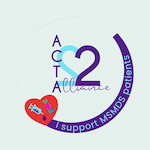MSMDS Awareness Day Date in the current year: June 10, 2026
 MSMDS Awareness Day is observed annually on June 10. The day was created to raise awareness about multisystemic smooth muscle dysfunction syndrome (MSMDS), an extremely rare genetic disorder caused by a mutation in the ACTA2 gene.
MSMDS Awareness Day is observed annually on June 10. The day was created to raise awareness about multisystemic smooth muscle dysfunction syndrome (MSMDS), an extremely rare genetic disorder caused by a mutation in the ACTA2 gene.This gene encodes the ACTA2 protein, also known as alpha-smooth muscle actin, which is a key component of the contractile apparatus in smooth muscle cells. In other words, this protein is necessary for proper smooth muscle contraction in vessels and organs. Mutations in the ACTA2 gene. can cause various vascular diseases, including coronary artery disease, thoracic aortic aneurysm, abdominal aortic aneurysm, Moyamoya disease, transient ischemic attack/stroke, and multisystemic smooth muscle dysfunction syndrome (MSMDS).
MSMDS is an ultra-rare disease., with fewer than 50 cases identified worldwide to date. The disease is called “multisystemic” because, unlike other ACTA2-associated diseases that affect only blood vessels, it can also affect internal organs such as the bladder, esophagus, lungs, and stomach.
The three key signs of MSMDS are:
- Aortopulmonary window (a faulty connection between the aorta and the main pulmonary artery) or patent ductus arteriosus (an unclosed hole in the aorta)
- Congenital mydriasis (permanently dilated pupils)
- White matter changes (abnormalities in the white matter of the brain)
Genetic testing for an ACTA2 mutation should be performed when at least two of these signs are present.
Other health problems. associated with MSMDS include pulmonary hypertension, aortic aneurysms, cerebrovascular disease, gut dysmotility, intestinal malrotation, impaired bladder function (either atonic or hypotonic bladder), and chronic lung disease.
There is no cure for MSMDS. Treatment. focuses on managing symptoms, preventing or minimizing complications, and improving quality of life. Because MSMDS affects multiple organs, patients require frequent monitoring and consultations with various specialists, such as cardiologists, pulmonologists, urologists, neurologists, gastroenterologists, and ophthalmologists. Ideally, these specialists would work together as a multidisciplinary team.
Since each case is unique, treatment plans should be personalized for each patient. Patients with MSMDS often require multiple procedures and surgeries. to repair anomalies in affected organs and systems. They may also require medications to treat symptoms such as seizures, low blood pressure, and clotting in narrowed vessels.
The abilities and lifestyle. of children affected by MSMDS depend on the disease’s severity. Most can live relatively normal lives, though some activities are restricted to prevent the progression of aortic and vascular disease. Others may struggle with lack of bladder control, learning disabilities, or an inability to breathe without a ventilator.
ACTA2 Alliance, a nonprofit organization working to raise awareness of MSMDS and other diseases associated with mutations in the ACTA2 gene, created MSMDS Awareness Day. You can get involved by learning more about MSMDS, sharing what you’ve learned with others, making a donation to ACTA2 Alliance, raising funds for the organization, and spreading the word on social media with the hashtag #MSMDSAwarenessDay.
- Category
- International Observances
- Tags
- MSMDS Awareness Day, multisystemic smooth muscle dysfunction syndrome, international observances, awareness days, genetic conditions